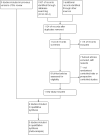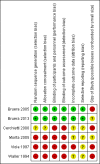Medically assisted hydration for adult palliative care patients
- PMID: 24760678
- PMCID: PMC8988261
- DOI: 10.1002/14651858.CD006273.pub3
Medically assisted hydration for adult palliative care patients
Update in
-
Medically assisted hydration for adults receiving palliative care.Cochrane Database Syst Rev. 2023 Dec 14;12(12):CD006273. doi: 10.1002/14651858.CD006273.pub4. Cochrane Database Syst Rev. 2023. PMID: 38095590 Free PMC article.
Abstract
Background: Many palliative care patients have reduced oral intake during their illness. The management of this can include the provision of medically assisted hydration with the aim of prolonging the life of a patient, improving their quality of life, or both. This is an updated version of the original Cochrane review published in Issue 2, 2008, and updated in February 2011.
Objectives: To determine the effect of medically assisted hydration in palliative care patients on their quality and length of life.
Search methods: We identified studies by searching the Cochrane Central Register of Controlled Trials (CENTRAL), MEDLINE, EMBASE, CINAHL, CANCERLIT, Caresearch, Dissertation abstracts, SCIENCE CITATION INDEX and the reference lists of all eligible studies, key textbooks and previous systematic reviews. The date of the latest search conducted on CENTRAL, MEDLINE and EMBASE was March 2014.
Selection criteria: All relevant randomised controlled trials (RCTs) or prospective controlled studies of medically assisted hydration in palliative care patients.
Data collection and analysis: We identified six relevant studies for this update. These included three RCTs (222 participants), and three prospective controlled trials (360 participants). Two review authors independently assessed the studies for quality and validity. The small number of studies and the heterogeneity of the data meant that a quantitative analysis was not possible, so we included a description of the main findings.
Main results: One study found that sedation and myoclonus (involuntary contractions of muscles) scores were improved more in the intervention group. Another study found that dehydration was significantly higher in the non-hydration group, but that some fluid retention symptoms (pleural effusion, peripheral oedema and ascites) were significantly higher in the hydration group. The other four studies (including the three RCTs) did not show significant differences in outcomes between the two groups. The only study that had survival as an outcome found no difference in survival between the hydration and control arms.
Authors' conclusions: Since the last version of this review, we found one new study. The studies published do not show a significant benefit in the use of medically assisted hydration in palliative care patients; however, there are insufficient good-quality studies to inform definitive recommendations for practice with regard to the use of medically assisted hydration in palliative care patients.
Conflict of interest statement
None known.
Figures
Update of
-
Medically assisted hydration for palliative care patients.Cochrane Database Syst Rev. 2008 Apr 16;(2):CD006273. doi: 10.1002/14651858.CD006273.pub2. Cochrane Database Syst Rev. 2008. Update in: Cochrane Database Syst Rev. 2014 Apr 23;(4):CD006273. doi: 10.1002/14651858.CD006273.pub3. PMID: 18425944 Updated.
References
References to studies included in this review
Bruera 2005 {published data only}
-
- Bruera E, Sala R, Rico MA, Moyano J, Centeno C, Willey J, et al. Effects of parenteral hydration in terminally ill cancer patients: a preliminary study. Journal of Clinical Oncology 2005;23:2366‐71. - PubMed
Bruera 2013 {published data only}
Cerchietti 2000 {published data only}
-
- Cerchietti L, Navigante A, Sauri A, Palazzo F. Hypodermoclysis for control of dehydration in terminal‐stage cancer. International Journal of Palliative Nursing 2000;6:370‐4. - PubMed
Morita 2005 {published data only}
-
- Morita T, Hyodo I, Yoshimi T, Ikenaga M, Tamura Y, Yoshizawa A, et al. Association between hydration volume and symptoms in terminally ill cancer patients with abdominal malignancies. Annals of Oncology 2005;16:640‐7. - PubMed
Viola 1997 {published data only}
-
- Viola RA. Studying Fluid Status and the Dying: The Challenge of Clinical Research in Palliative Care [MSc thesis]. Canada: University of Ottawa, 1997.
Waller 1994 {published data only}
-
- Waller A, Hershkowitz M, Adunsky A. The effect of intravenous fluid infusion on blood and urine parameters of hydration and on state of consciousness in terminal cancer patients. American Journal of Hospice & Palliative Care 1994;11:22‐7. - PubMed
References to studies excluded from this review
Morita 2002 {published data only}
-
- Morita T, Tei Y, Inoue S, Suga A, Chihara S. Fluid status of terminally ill cancer patients with intestinal obstruction: an exploratory observational study. Supportive Care in Cancer 2002;10:474‐9. - PubMed
Morita 2006 {published data only}
-
- Morita T, Hyodo I, Yoshimi T, Ikenaga M, Tamura Y, Yoshizawa A, et al. Artificial hydration therapy, laboratory findings, and fluid balance in terminally ill patients with abdominal malignancies. Journal of Pain & Symptom Management 2006;31:130‐9. - PubMed
Additional references
Abernethy 2003
Ashby 1995
Bozzetti 1996
-
- Bozzetti F, Amadori D, Bruera E, Cozzaglio L, Corli O, Filiberti A, et al. Guidelines on artificial nutrition versus hydration in terminal cancer patients. European Association for Palliative Care. Nutrition 1996;12(3):163‐7. - PubMed
Breitbart 2002
-
- Breitbart W, Tremblay A, Gibson C. An open trial of olanzapine for the treatment of delirium in hospitalized cancer patients. Psychosomatics 2002;43(3):175‐82. - PubMed
Casarett 2005
-
- Casarett D, Kapo J, Caplan A. Appropriate use of artificial nutrition and hydration‐fundamental principles and recommendations. New England Journal of Medicine 2005;353(24):2607‐12. - PubMed
Craig 1994
Dev 2012
-
- Dev R, Dalal S, Bruera E. Is there a role for parenteral nutrition or hydration at the end of life?. Current opinion in supportive and palliative care 2012;6(3):365‐70. [PUBMED: 22801468] - PubMed
Doyle 2004
-
- Doyle D, Hanks G, Cherny NI, Calman K. Oxford Textbook of Palliative Medicine. 3rd Edition. Oxford: Oxford University Press, 2004.
Good 2014
Higgins 2011
-
- Higgins JPT, Green S (editors). Cochrane Handbook for Systematic Reviews of Interventions Version 5.1.0 [updated March 2011]. The Cochrane Collaboration, 2011. Available from www.cochrane‐handbook.org.
Jadad 1996
-
- Jadad AR, Moore RA, Carroll D, Jenkinson C, Reynolds DJ, Gavaghan DJ, et al. Assessing the quality of reports of randomized clinical trials: is blinding necessary?. Controlled Clinical Trials 1996;17(1):1‐12. - PubMed
Lanuke 2003
-
- Lanuke K, Fainsinger RL. Hydration management in palliative care settings‐a survey of experts. Journal of Palliative Care 2003;19(4):278‐9. - PubMed
Morita 1998
-
- Morita T, Ichiki T, Tsunoda J, Inoue S, Chihara S. A prospective study on the dying process in terminally ill cancer patients. American Journal of Hospital Palliative Care 1998;15(4):217‐22. - PubMed
Raijmakers 2011
-
- Raijmakers NJ, Fradsham S, Zuylen L, Mayland C, Ellershaw JE, Heide A. Variation in attitudes towards artificial hydration at the end of life: a systematic literature review. Current opinion in supportive and palliative care 2011;5(3):265‐72. [PUBMED: 21738035] - PubMed
Rees 2003
Rinck 1997
-
- Rinck GC, Bos GA, Kleijnen J, Haes HJ, Schade E, Veenhof CH. Methodologic issues in effectiveness research on palliative cancer care: a systematic review. Journal of Clinical Oncology 1997;15(4):1697‐707. - PubMed
WHO 2005
-
- World Health Organization. WHO definition of palliative care. www.who.int/cancer/palliative/definition/en/ (accessed 3 April 2014).
Publication types
MeSH terms
LinkOut - more resources
Full Text Sources
Other Literature Sources
Medical




